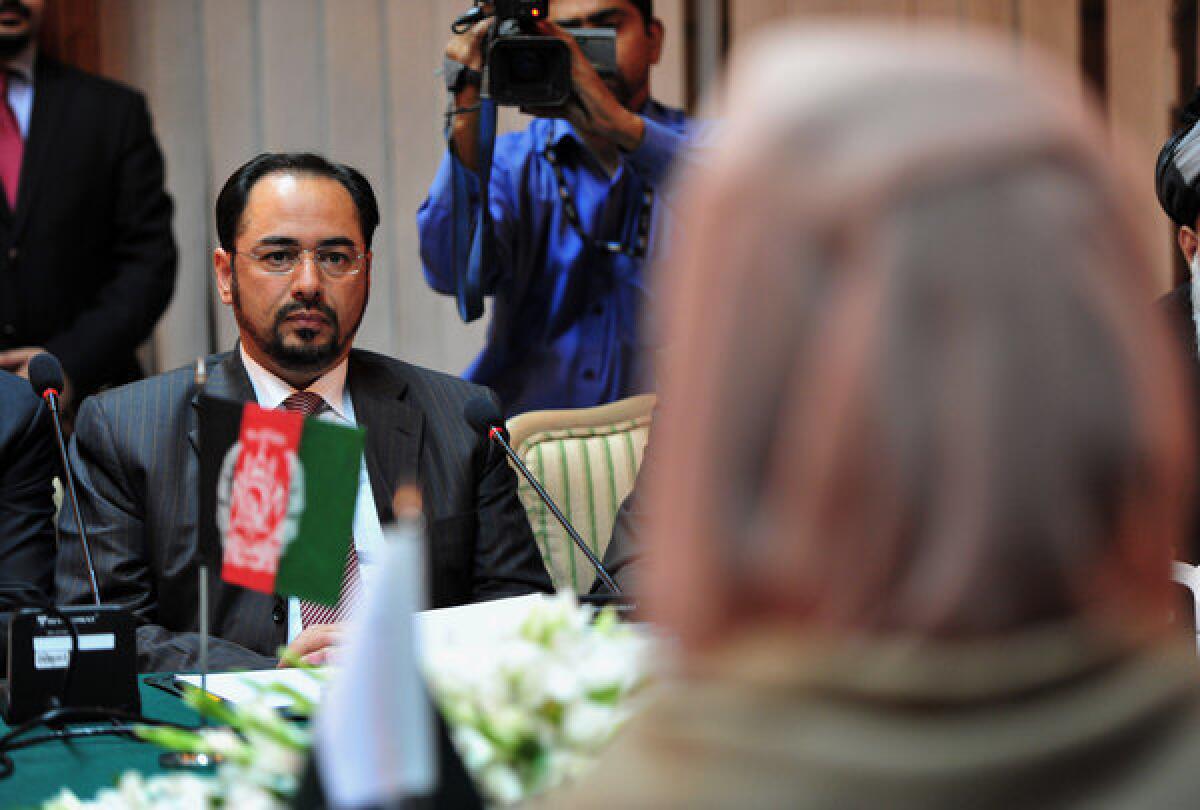Pakistan agrees to free several Afghan Taliban detainees

- Share via
ISLAMABAD, Pakistan — Pakistan on Wednesday agreed to free several Afghan Taliban detainees, a gesture that suggested Islamabad may be willing to help Washington and Kabul reconcile with Afghan insurgents.
The exact number of militants to be released was not known, though Pakistani media reported that it was not more than 10. It was also unclear whether any of the detainees were major figures within the Taliban hierarchy.
Pakistani officials announced the planned release as Afghan President Hamid Karzai’s top peace negotiator, Salahuddin Rabbani, prepared to wrap up a four-day visit to Islamabad aimed at enlisting Pakistan’s help in revving up momentum for peace talks.
In a prepared statement, Pakistan’s Foreign Ministry said the detainees were being released as a gesture “in support of the peace and reconciliation process, and in response to the requests of the Afghan government.”
There were no signs Wednesday that the release would entice Afghan Taliban commanders to warm to the idea of negotiations with the Afghan government. The Taliban has balked at earnestly sitting down for peace talks for several years, and analysts have said the insurgents’ preferred strategy is to wait for U.S. forces to leave Afghanistan before attempting to seize power.
Pakistan’s accommodation of Kabul’s request, nevertheless, signaled a new willingness to play a role in Taliban reconciliation efforts. Pakistan has long-standing ties with Afghan Taliban leaders dating to the Soviet occupation of Afghanistan, and many experts believe Islamabad continues to support Afghan insurgents. That support is seen as a hedge against India, Pakistan’s nuclear archrival, which has been nurturing stronger ties with Karzai’s administration.
With the U.S. braced to pull most of its troops out of Afghanistan by the end of 2014, Islamabad worries that without Taliban reconciliation civil war could break out in Afghanistan. The violence could spill over the porous Afghan-Pakistani border and embolden Pakistan’s own insurgency, the Pakistani Taliban.
Pakistani security analyst Hasan Askari Rizvi called the release of the Taliban prisoners “a step toward encouraging dialogue” between leaders in Kabul and Afghan Taliban leaders. “But we don’t know how senior are these guys, and whether they will be able to convince some of [Afghan Taliban leader] Mullah Omar’s people to sit down for dialogue.”
Among those not believed to be on the list of detainees being released, according to Pakistani media, was the Afghan Taliban’s second in command, Mullah Baradar, who was captured by Pakistani forces in Karachi in 2010.
Some experts believe Pakistan took Baradar into custody because they knew he was holding secret talks with Karzai and, angered that it was left out of the negotiations, wanted to thwart Karzai’s efforts.
During his visit, Rabbani met with several top Pakistani civilian and military leaders, including President Asif Ali Zardari, Prime Minister Raja Ashraf and army chief Gen. Ashfaq Kayani.
Rabbani’s predecessor was his father, Burhanuddin Rabbani, who was assassinated last year at his home by a suicide bomber posing as a Taliban emissary. At the time, several top Afghan officials blamed Pakistan’s top spy agency, Inter-Services Intelligence, for facilitating the attack — a charge that Pakistani officials have strongly denied.
ALSO:
Bleakness only a child’s smile can lift
Russia levies rare punishment for poaching tigers
Obama reassessing sensitive foreign issues now that election is over
More to Read
Sign up for Essential California
The most important California stories and recommendations in your inbox every morning.
You may occasionally receive promotional content from the Los Angeles Times.










